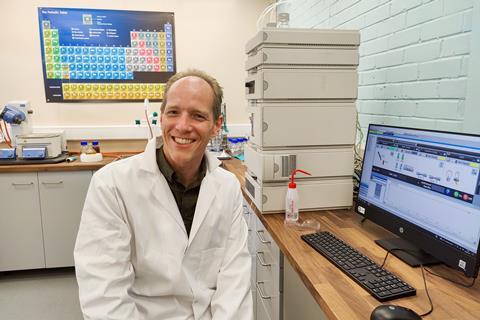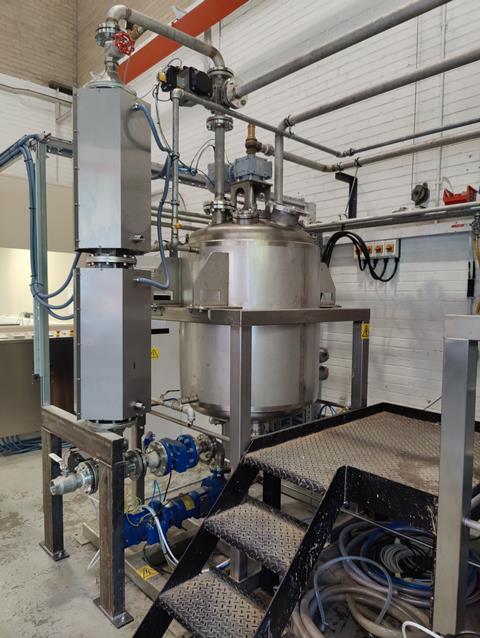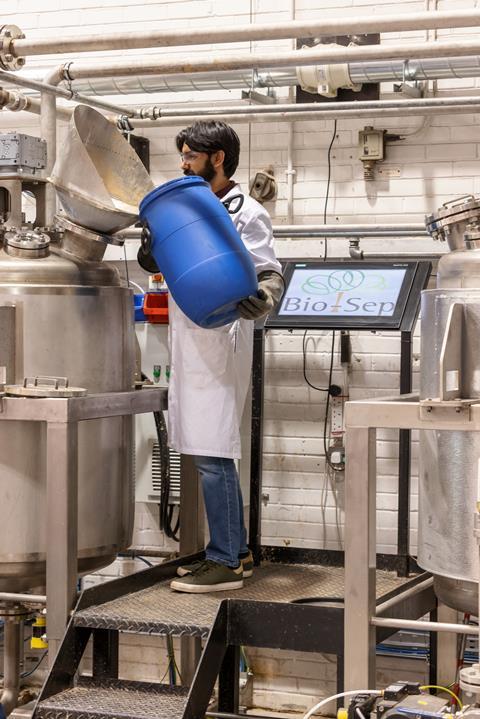Extracting valuable platform chemicals from waste biomass isan important part of the path to developing a circular, sustainable materials economy. But doing it is tricky, says Andy West, chief chemist at Bio-Sep.
‘The process should be straightforward, but it’s not,’ he says. ‘Plants, in general, don’t want to be degraded, they want to stay rigid and upright so fractionating is difficult. And so is maintaining the quality of the compounds.’

Ten years ago, West was working at Leicestershire-based product development contractor, Pera Technology, when Bio-Sep’s founders approached him with a technology that converts the by-products of forestry and agriculture into high-value chemicals.
What seems like a great pitch now was not an obvious winner at the time, West recalls. ‘There wasn’t an agenda on sustainability. Big companies were saying, we’ve got plenty of petrochemical-derived chemicals and it will be a while before we need this. I think there was some foresight in Bio-Sep at the time.’

With Pera’s help, Bio-Sep won an EU grant to work with a consortium of academics and industry across Europe to turn the technology from a concept into a pilot project. This project, which ran until 2014, saw the company fine tune a process that is harsh enough to break down woody material into its constituent parts, but also gentle enough to keep the resulting molecules, and their functionality, intact.
‘If you think of the petrochemical industry, they take a lump of coal and heat it, distil it, fractionate off the good stuff, and then they have a lot of chemistry that needs to be done in order to turn it into a useful molecule,’ West says. ‘What we’re trying to do is maintain that clever chemistry the plant has already developed and produce something that is useful in existing markets.’
Bio-Sep uses a patented ultrasound process to generate cavitation – focused, high pressure waves – that gently breaks chemical bonds and converts lignocellulosic biomass into cellulose, sugars and lignin.
The technology uses lower temperature and pressure compared to comparable fractionation processes, as well as being faster and more efficient, West says. ‘We’re only operating at the boiling point of water,’ he explains. ‘We’re not using any mineral acids and we don’t need any fancy catalysts. It’s an amazingly simple process – it all comes from the power of ultrasound.’
Pera collapsed in 2015 and West stayed with Bio-Sep, which was by then operating a pilot plant with a capacity of 50kg per batch. Now, the company is preparing to build its first commercial plant, with a capacity to process 10,000 tonnes of feedstock per year, largely from sawmill residues.That could yield around 2500 tonnes of lignin a year, 5000 tonnes of cellulose and 2000 tonnes of mixed sugars, West explains. ’Our process generates virtually no waste, so 95% of the feedstock ends up as product.’
Scaling up to this level was not easy, West says. ‘Ultrasound is a very mature technology but not really used to treat slurries,’ he says. ‘This isn’t a technology that’s easily converted into something that is batch-continuous or ultimately continuous.’
The company spent a long time working with sonication companies to design a system that is ‘basically non-contact’, West says, to allow the ultrasound to travel longer distances without using vast amounts of energy.

The cellulose, sugars and lignin that Bio-Sep produces can replace petrochemicals used in a vast array of potential applications, from cosmetics to food and composite materials. For example, the company is running a project with the National Composites Centre that would use its material as a replacement for fibreboard – ‘effectively, a mouldable wood,’ West says.
Industries are keen to acquire ingredients and materials that have been sourced sustainably, and Bio-Sep’s products offer a route away from relying on petrochemicals, West says. The company’s potential customers are also keen to source chemicals from within the UK, he adds. ‘One of the things that’s been happening since Brexit is that imports are becoming very expensive. If you look at the amount of waste generated in Scotland from the forestry industry, that could supply us with thousands of tonnes of feedstock material per year.’
After winning the RSC’s emerging technologies competition in 2021, Bio-Sep raised its first round of investment and increased its staff from one – West himself – to seven full-time employees. Now, it has ambitions to break ground with its first commercial plant in 2024.
Bio-Sep
Date of founding: 2008
Location: Leicestershire, UK
Number of employees: 7
Origin: Independent start-up
Total investment to date: £3.2 million